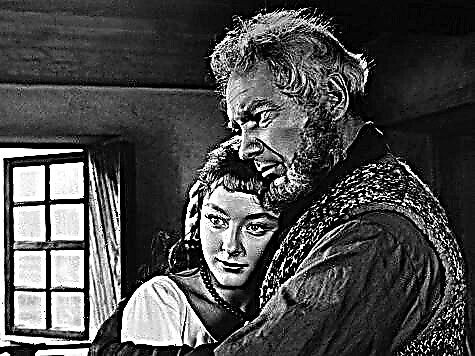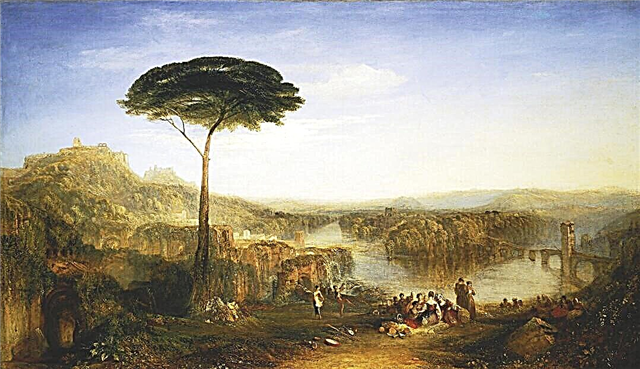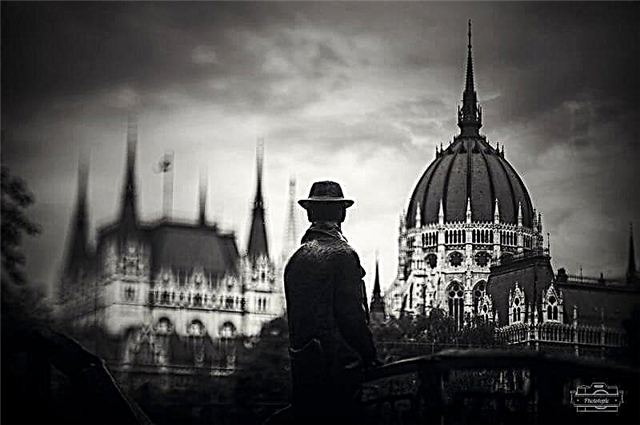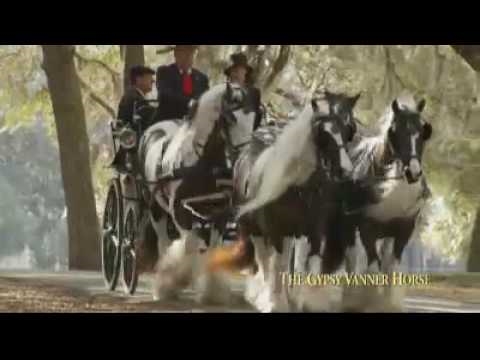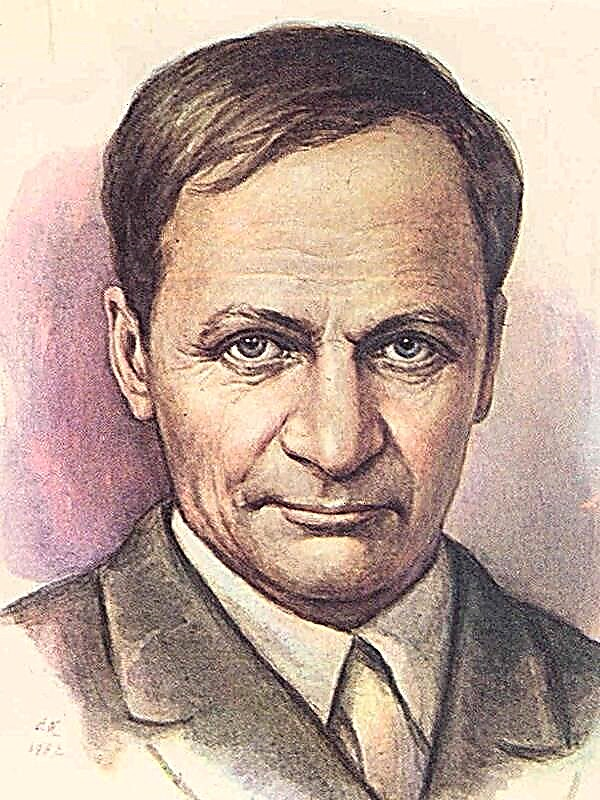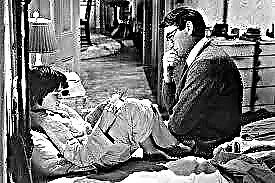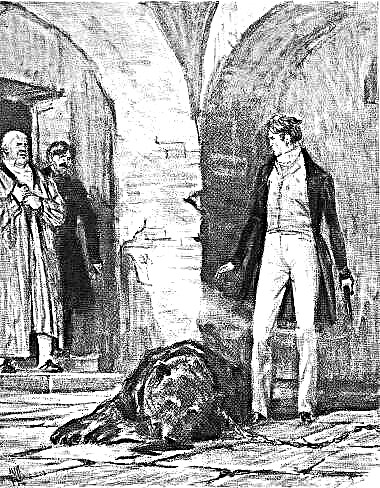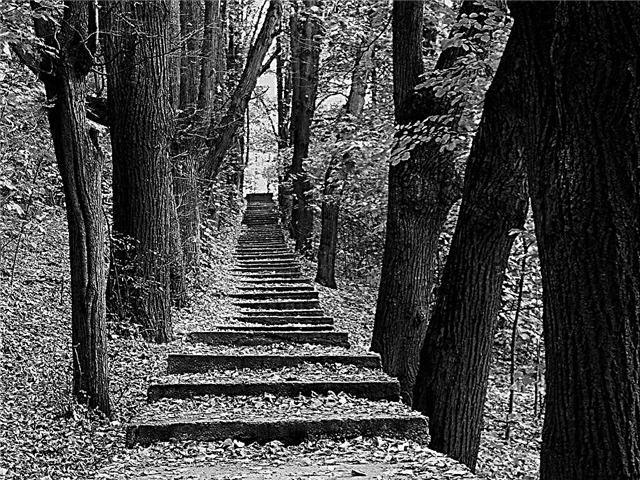Already foreseeing his fate, Georgy Nikolayevich Zybin, a thirty-year-old historian, an employee of the local history museum in Alma-Ata, persuaded himself to live “right”: “quietly, quietly, imperceptibly, imperceptibly, not to push anyone, not to hurt - I’m the guardian of antiquities, and that’s all! " What can interfere with his quiet work and life? The museum director, a former military man, treats him with respect and almost paternal care. Nearby is a faithful friend and drinking companion, an old wise Grandfather working as a carpenter in the museum. Nearby is the beauty Clara, clever and lovely, secretly in love with him. A young scientist Kornilov appeared in the museum, expelled from Moscow, a man for Zybin from the breed of “his own” - both by fate and by education. And the very nature of his work - the study of museum exhibits, should kindly protect Zybin from that incomprehensible and terrible than the air of the summer of 1937 was watered. It is only necessary - "quietly." At Zybin - does not work. First comes the old Rodionov, a neophyte archaeologist and a former partisan, with his "discoveries" and demands to begin excavations of the ancient capital in the place that he indicates. Zybin knows that to resist the force of aggressive ignorance of the "broad masses" intruding into science, is senseless and dangerous in modern times. He knows, but resists as much as he can. In the museum itself, there are constantly clashes with the illiterate, but ideologically savvy crowd, Zoya Mikhailovna, trying to “tweak” Zybin’s work. Collaboration with the newspaper, where Zybin writes, as it seems to him, are absolutely neutral notes about culture, well, for example, about the rarities stored in the republican library, but which have not been worthy of the attention of the library’s scientists — this collaboration ends with the clarification of relations with the secretary-scientist Dupova library. Zybin did not reflect the work of librarians in servicing the broad masses of workers and students, she says, culture is what can and should serve the needs of the broad masses, and not a handful of tall-minded specialists. These attacks are not so harmless - at the service of complainants are always ready to listen to their "native organs". Zybina is warned by the friendly director: “Don't be partisan, be more polite,” and Grandfather asks to relieve himself. Zybin would be glad to calm down, but he cannot. He cannot observe from the outside how the newspaper hype around the gigantic boa, allegedly living on the Mountain Giant collective farm, inflated by ignorant, sensationalist journalists, threatens to ruin the life of team leader Potapov, the only one who saw the snake. And the polite and attentive "lawyers on vacation" have already become frequent on the collective farm - they are circling around Potapov, are eyeing museum workers who have come to the excavations. A car "accidentally" met on a night road takes Zybin to the "lawyers", where he is amiably explained to him that Potapov is an agent of German intelligence, and the story of the snake is a "cunningly sabotage". But that night, meeting with the hiding Potapov, Zybin not only did not try to "neutralize the enemy", but did everything to help him - a desperate team leader was able to find and kill the "giant boa", which turned out to be really big, but still an ordinary snake. A bag with a dead snake, the brigadier’s last hope for salvation, they together deliver to the city, to the museum. That ends the story.
But Zybin feels that this is only a respite. For a long time he tried not to see, not to understand the logic of what was happening around him - deaf arrests, show trials, aroused from above hysteria of "vigilance" and "struggle against complacency." Zybin, brought up on the humanistic culture with which the European world entered the 20th century, is not easy to believe in the total wildness of people. In the ease with which the souls of people are conquered by the aftermaths of the Grand Inquisitor. In nightly delusional dreams, Zybin talks with Stalin: “What if you’re right, the world will survive and prosper. Then, then, reason, conscience, goodness, humanity - everything that has been forged for thousands of years and was considered the goal of the existence of mankind, costs absolutely nothing. To save the world, you need iron and flamethrowers, stone cellars and people with Browning in them ... And I, like me, will have to fall to your boots, like an icon. " In such a situation, the problem of choice for Zybin is no longer a question of personal courage. It is part of that culture, that civilization that is threatened with destruction, and the rejection of resistance means for Zybin an agreement with the unnecessaryness of this culture, with the fact that all of it, and he himself, is a "faculty of unnecessary things." ... Unfamiliar workers bring to the museum a find - a handful of gold plaques, part of the treasure they found, making sure that the archaeological gold they found is found, the workers disappear without a trace. The treasure for the museum is lost. The incident is reported to the NKVD. But Zybin, not hoping for the help of the authorities, himself goes to the steppe in search of treasure. And here, in the steppe, what he has been waiting for a long time is happening - Zybin is being arrested. He was charged with anti-Soviet propaganda, embezzlement and an attempt to flee abroad. The case is led by department head Neumann, an experienced investigator, and an intellectual who serves the ideas of Stalin's rule of law not out of fear, but out of conscience, and a red-headed kid, a specialist in “knocking out evidence” Khripushin. Investigators do not have evidence of guilt, they expect to receive evidence from Zybin. A cellmate with a senior Buddha shares his wisdom with Zybin: since it’s impossible to get out of here anyway, it’s wiser to admit everything that is required — then the investigation will be easier and the time will be shorter. But just this is impossible for Zybin, this would mean his personal recognition of the right to legality of such a system of legal proceedings. Zybin decides to fight. And the first who, oddly enough, helped him to establish himself in this, turned out to be Khripushin, - being filled with professional anger, he begins to yell at Zybin, hoping to break the prisoner, and Zybin feels the necessary surge of reciprocal fury and strength - he crossed the threshold of fear. The "conveyor" method is applied to Zybin - continuously changing investigators interrogate him for days. Zybin holds on firmly, but he does not know that his arrest is only part of the big plan conceived by Neumann. He intends to obtain material for a grandiose - on the model of Moscow - show trial in the case of mass wrecking in the field of culture. Of course, one Zybin alone is not enough. The invitation to appear in the NKVD receives Kornilov. But they speak with him differently - at first they ask about Zybin, but then they explain what their main request is: to help the authorities close the case to another employee of the museum of the former priest Andrei Ernestovich Kutorgu. The NKVD has a denunciation on him, but the old man seems to be harmless, sorry for him, the investigators confidentially share with Kornilov. “If you are ready to vouch for him, do it. Just do it in evidence and formally, in written reports. ” Kornilov, who lives in Alma-Ata as a deportee and who has been waiting every day lately for his own arrest, greatly appreciates the imperious politeness of the investigators. Yes, and there’s nothing shameful in their request. Kornilov is taken to fulfill the order. The conversations that he holds with the former priest are devoted mainly to the history of the trial and execution of Christ, as well as to the topic of betrayal by the disciples of his Master. And Kornilov writes with good conscience reports on meetings in which he characterizes Father Andrei as a completely loyal citizen. His reports are accepted with gratitude, but in his last, as Kornilov hopes, a visit to the NKVD, he was invited to Colonel Gulyaev. The tone of the conversation with him changes dramatically - the colonel menacingly convicts Kornilov in trying to deceive the investigation. He shows written reports of the same conversations written by Kutorga - a former priest performed a similar task. Kornilov is accused of conducting anti-Soviet conversations in denunciations. Kornilov is crushed. He is asked to go out into the corridor to wait a bit and “forget” about him for almost a day. And then, half dead from fatigue and fear, he is taken away by Khripushin, given off with tea, ashamed, reports that this time they forgive him, but count on his honesty in their further joint work, picks up the agent name Gadfly Kornilova and warns once again: “Will you fint, do you know where they will send you?” “I know,” replies Kornilov, who is not resisting anything.
And new people are involved in the stalled investigation in the Zybin case. After Zybin demanded a change of investigator and went on a hunger strike, he is being held in a punishment cell, he is visited by the prosecutor Myachin and unexpectedly easily agrees with all the requirements. Myachin is the enemy of Neumann. The idea of a loud show trial seems to him nonsense. And here one more circumstance is revealed that the prosecutor on occasion can use against Neumann. Colonel Gulyaev is asked to receive an old and close acquaintance Zybina, Polina Pototskaya. The conversation with her is in the presence of Neumann and the prosecutor. And Polina, as it were, by the way, reports that there is another person with whom Zybin once conducted confidential conversations - Roman L. Stern. Neumann is shocked - the introduction of such a large figure as the head of the investigative department of the USSR Prosecutor's Office, a famous writer, and most importantly - Neumann's brother, complicates everything. Moreover, in the case of Zybin, the possibility of personal motives is revealed - Stern and Zybin once looked after Polina, and she preferred Zybin. The situation is becoming dangerous for Neumann. For not everything is so solid and stable in the life of seemingly omnipotent enkavedeshniki — more and more often their department is shaken by some internal tremors — the most reliable and trusted people suddenly disappear. Where they disappear is not a secret for Neumann and colleagues, each of them unconsciously waits for his turn. In addition, clever Neumann is also tormented by another fear, which imprinted in his eyes the expression of “clamped horror,” - fear of the very essence of his work. He can no longer justify himself with words about the highest expediency, getting acquainted, for example, with the rationalization proposal of colleagues about the rational use of the bodies of prisoners in their households, in particular, the use of the blood of dead or executed prisoners. And in order to improve their situation, which threatens to be shaken, in the NKVD, and in order to find inner peace, we need the results of the Zybin case. Neumann decides to replace the hackushman Khripushin with his niece Tamara Dolidze, who is just a beginner, but smart, educated, eager to work as an investigator; moreover, she is good at disarming the defendant.
Zybin is really shocked by the appearance of a young beautiful woman. But the result is the opposite. Zybin suddenly feels compassion for this unfortunate fool who changed the theater to the romance of the secret work of the manager of human lives. Without easily destroying the accusation scheme prepared by the new investigator, Zybin refers to it as a person who commits a tragic and irreparable mistake in life. And the girl is confused, she has nothing to object to. Their conversation is interrupted at a glance - for a long time feeling sick, Zybin loses consciousness right in the investigator's office. He is being transferred to the hospital. The investigation stops again. Trying to help her niece correct mistakes, Neumann decides to independently obtain irrefutable evidence against Zybin and repeats the Zybin route along the steppe. During the trip, he was overtaken by the news of a change of leadership in the management of the NKVD, the arrest of investigators and that he was urgently called to the office. This is the end, Neumann understands. He decides to spend the last hours at large at the barmaid who was met by chance at his acquaintance and discovers in her the very archaeological gold that Zybin is accused of embezzlement. Having seized the gold and arresting the treasure hunters, Neumann returns to the city. A few days later, in the presence of the colonel and the prosecutor, Zybin was shown the gold they had found and announced that his case was closed. Zybin is free. And let this liberation happen, thanks to a happy coincidence, Zybin feels like a winner - he could survive.
The first person Zybin met when he left the NKVD administration building was Neumann. He deliberately waited for Zybin. “Why this?” - asks Zybin. “Yes, I myself think, why? .. Congratulations on the release. If necessary, bring home, run away to the bench. "
Zybin strikes Neumann's face, his eyes are humanly simple and sad. The expression of that hidden horror that Zybin noticed a month ago was gone. And in the park, where Zybin and Neumann set off to drink for release, Kornilov joined them. They are located on a bench, directly opposite the artist, who, noticing the expressive silhouette of Zybin, asked him to sit a bit and began to quickly sketch the figures. So on a square piece of cardboard these three remained: the ousted investigator, the drunk informant nicknamed Gadfly, and the third, without whom the two could not exist.

